

Agrapha. Agrapha (αγραφον; Greek for "non written"; singular agraphon) are sayings of Jesus that are not found in the canonical Gospels.

The term was used for the first time by J.G. Körner, a German Bible scholar in 1776. Definition of agrapha[edit] The Agrapha must satisfy three conditions: They must be Sayings, not discourses Works like the "Didascalia" and the "Pistis Sophia", that tell about Jesus, but do not quote him, are not considered. They must be Sayings of Jesus Therefore Agrapha are not Sayings found in religious romances such as those found in apocryphal Gospels, the apocryphal Acts, or the Letter of Christ to Abgar, etc.
They must not be in the canonical Gospels So, mere additions to pre-existing Sayings are not Agrapha. Examples[edit] According to the Roman Catholic Church, for Agrapha to be genuine, they must be supported by external and internal evidence. New Testament[edit] Apocryphal Scriptures[edit] Patristic citations[edit] Oxyrhynchus Logia[edit] See also[edit] External links[edit] Holy Spirit (Christianity) The New Testament includes over 90 references to the Holy Spirit.[4] The sacredness of the Holy Spirit is affirmed in all three Synoptic Gospels which proclaim blasphemy against the Holy Spirit as the unforgivable sin.[5] The Holy Spirit plays a key role in the Pauline epistles.[6] In the Johannine writings, three separate terms, "Holy Spirit", "Spirit of Truth", and "Paraclete" are used.[7] The Greek word pneuma, generally translated spirit, is found around 385 times in the New Testament, with some scholars differing by three to nine occurrences.[15] Pneuma appears 105 times in the four canonical gospels, 69 times in the Acts of the Apostles, 161 times in the Pauline epistles, and 50 times elsewhere.[15] These usages vary, e.g. in 133 cases it refers to spirit in the general sense, 153 cases to spiritual, and possibly 93 times in reference to the Holy Spirit.[15] In a few cases it is also used to mean wind or life.[15]
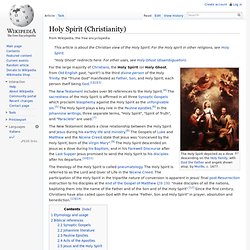
New Wine into Old Wineskins. New Wine into Old Wineskins is, according to the New Testament, one of a pair of parables told by Jesus.
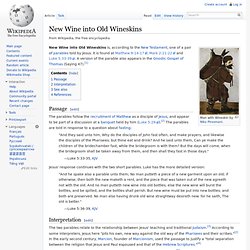
It is found at Matthew 9:14-17, Mark 2:21-22 and Luke 5:33-39. A version of the parable also appears in the Gnostic Gospel of Thomas (Saying 47).[1] Passage[edit] The parables follow the recruitment of Matthew as a disciple of Jesus, and appear to be part of a discussion at a banquet held by him (Luke 5:29).[2] The parables are told in response to a question about fasting: Head of the Church. Head of the Church is a title given in the New Testament to Jesus.
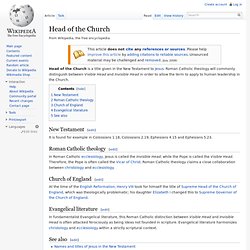
Roman Catholic theology will commonly distinguish between Visible Head and Invisible Head in order to allow the term to apply to human leadership in the Church. New Testament[edit] It is found for example in Colossians 1.18, Colossians 2.19, Ephesians 4.15 and Ephesians 5.23. Roman Catholic theology[edit] Spiritual gift. Spiritual gifts are distinguished from other graces of the Holy Spirit, such as the fruit of the Spirit and the Seven Gifts of the Holy Spirit, in that the charismata are to be used for the benefit of others while the fruit of the Spirit and other gifts result in personal sanctification.[8] Biblical and theological overview[edit]

Attributes of God in Christianity. Name of God in Christianity. In Christian theology the name of God has always had much deeper meaning and significance than being just a label or designator.
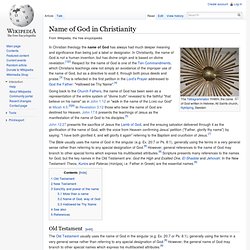
In Christianity, the name of God is not a human invention, but has divine origin and is based on divine revelation.[1][2] Respect for the name of God is one of the Ten Commandments, which Christians teachings view not simply an avoidance of the improper use of the name of God, but as a directive to exalt it, through both pious deeds and praise.[3] This is reflected in the first petition in the Lord's Prayer addressed to God the Father: "Hallowed be Thy Name".[4] Old Testament[edit] The Old Testament usually uses the name of God in the singular (e.g. Ex. 20:7 or Ps. 8:1), generally using the terms in a very general sense rather than referring to any special designation of God.[8] However, the general name of God may branch to other special names which express his multifaceted attributes.[8] New Testament[edit]
Great Tribulation. The Great Tribulation (Greek: θλίψις μεγάλη, thlipsis megalē) refers to tumultuous events that are described during the "signs of the times", first mentioned by Jesus in the Olivet discourse.[1] The Great Tribulation is also referenced in the Book of Revelation.[2] Biblical description[edit] Within the ninth chapter of the Book of Revelation, the Tribulation is described as follows:

Whore of Babylon. The Whore of Babylon or "Babylon the Great" is a Christian figure of evil mentioned in the Book of Revelation in the Bible.
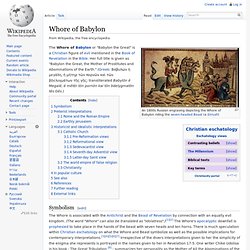
Her full title is given as "Babylon the Great, the Mother of Prostitutes and Abominations of the Earth. " (Greek: Βαβυλὼν ἡ μεγάλη, ἡ μήτηρ τῶν πορνῶν καὶ τῶν βδελυγμάτων τῆς γῆς; transliterated Babylōn ē Megalē, ē mētēr tōn pornōn kai tōn bdelygmatōn tēs Gēs.) Creation myth. Creation myths develop in oral traditions and therefore typically have multiple versions[3] and are the most common form of myth, found throughout human culture.[6] Definitions[edit] In Daoist creation myth, "The Way gave birth to unity; unity gave birth to duality; duality gave birth to trinity; trinity gave birth to the myriad creatures.
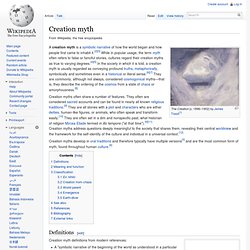
" (Daodejing, 4th century BCE)[13] Gender of the Holy Spirit. Spiritual gift. Hymnal. Hymnal or hymnary or hymnbook is a collection of hymns, i.e. religious songs, usually in the form of a book.
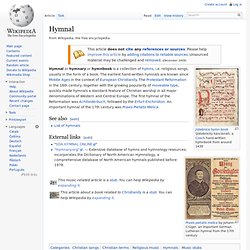
Aspersion. Aspersion (la. aspergere/aspersio), in a religious context, is the act of sprinkling with water, especially holy water. Aspersion is a method used in baptism as an alternative to immersion or affusion. The word is formed of the Latin aspergere, 'to sprinkle', of ad, 'to', and spargo, 'I scatter' (Ezekiel 36:25-26, 1 Corinthians 10:2, cf. Pentecostalism. Like other forms of evangelical Protestantism, Pentecostalism adheres to the inerrancy of scripture and the necessity of accepting Christ as personal Lord and Savior. It is distinguished by belief in the baptism with the Holy Spirit as an experience separate from conversion that enables a Christian to live a Holy Spirit–filled and empowered life.
This empowerment includes the use of spiritual gifts such as speaking in tongues and divine healing—two other defining characteristics of Pentecostalism. Because of their commitment to biblical authority, spiritual gifts, and the miraculous, Pentecostals tend to see their movement as reflecting the same kind of spiritual power and teachings that were found in the Apostolic Age of the early church. For this reason, some Pentecostals also use the term Apostolic or full gospel to describe their movement. Antinomianism. In Christianity, an antinomian is "one who holds that under the gospel dispensation of grace the moral law is of no use or obligation because faith alone is necessary to salvation".[1] Many antinomians, however, believe that Christians will obey the moral law despite their freedom from it. The distinction between antinomian and other Christian views on the moral law is that antinomians believe that obedience to the law is motivated by an internal principle flowing from belief rather than any external compulsion.[2] Examples are Martin Luther's critique of antinomianism and the Antinomian Controversy of the 17th century Massachusetts Bay Colony.
Although the term originated in the 16th century, the topic has its roots in Christian views on the old covenant extending back to the 1st century. It can also be extended to any individual who rejects a socially established morality.[1] Few groups, other than Christian anarchists or Jewish anarchists, explicitly call themselves antinomian. Transubstantiation. The Eastern Orthodox Church, Oriental Orthodox Church, and Church of the East have sometimes used the term "transubstantiation" (metousiosis); however, terms such as "divine mystery", "trans-elementation" (μεταστοιχείωσις metastoicheiosis), "re-ordination" (μεταρρύθμισις metarrhythmisis), or simply "change" (μεταβολή) are more common among them and they consider the change from bread and wine to flesh and blood a "Mystery". History[edit] During the Protestant Reformation, the doctrine of transubstantiation was heavily criticised as an Aristotelian "pseudophilosophy"[17] imported into Christian teaching and jettisoned in favor of Martin Luther's doctrine of sacramental union, or in favor, per Huldrych Zwingli, of the Eucharist as memorial.[18] Patristic period[edit] A letter by Saint Ignatius of Antioch to the Romans, written in AD 106 says: "I desire the bread of GOD, which is the flesh of Jesus Christ.
Saint Ambrose of Milan (d. 397) wrote: Yahweh. By early post-biblical times, the name of Yahweh had ceased to be pronounced. Infidel. Self-enquiry. Ramana Maharshi. Ascension of Jesus. By the 6th century the iconography of the ascension in Christian art had been established and by the 9th century ascension scenes were being depicted on domes of churches.[5][6] Many ascension scenes have two parts, an upper (Heavenly) part and a lower (earthly) part.[7] The ascending Jesus is often shown blessing with his right hand - directed towards the earthly group below him and signifying that he is blessing the entire Church.[8] Live by the sword, die by the sword. "Live by the sword, die by the sword" is a saying derived from a biblical parable to the effect that if you use violence, or other harsh means, against other people, you can expect to have those same means used against you; "You can expect to become a victim of whatever means you use to get what you want.
"[1] Then said Jesus unto him, Put up again thy sword into his place: for all they that take the sword shall perish with the sword (Matthew 26:52, King James Version) Sayings of Jesus on the cross. Christian Rosenkreuz. Existence of God. Arguments for and against the existence of God have been proposed by philosophers, theologians, scientists, and others for thousands of years. Joseph of Arimathea. Pilate, after a centurion confirmed the death, allowed Joseph's request. Joseph immediately purchased fine linen (Mark 15:46) and proceeded to Golgotha to take the body of Jesus down from the cross. There, according to John 19:39, Joseph and Nicodemus took the body, wrapped it in the fine linen, and applied the myrrh and aloes Nicodemus had brought.
Resurrection of Jesus. Henosis. Henosis (Ancient Greek: ἕνωσις) is the classical Greek word for mystical "oneness", "union" or "unity. " Munkar and Nakir. Raphael (archangel) Palmoni. Batariel. Tamiel. Nuriel. Sariel. Pahaliah. Selaphiel. Angel of the Lord. Jesus, King of the Jews. Son of man (Christianity) The Sheep and the Goats. Jehovah's Witnesses and salvation. List of dates predicted for apocalyptic events.
Islamic eschatology. Kingdom of God (Christianity) Tim LaHaye. Lake of fire. Gehenna. Satan. Kroni. Ifrit. Devil (Islam) Devil. Azazel. Belial. Tannin (demon) Lucifer. Christian martyrs.